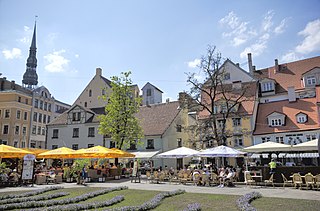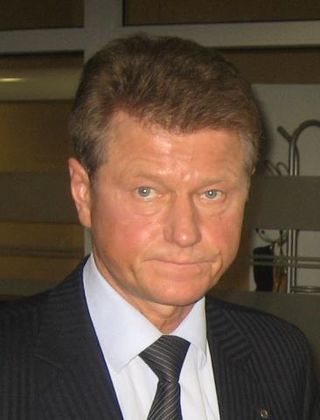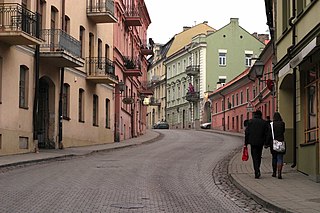Related Research Articles

Lithuania, officially the Republic of Lithuania, is a country in the Baltic region of Europe. It is one of three Baltic states and lies on the eastern shore of the Baltic Sea. Lithuania shares land borders with Latvia to the north, Belarus to the east and south, Poland to the south, and Russia to the southwest. It has a maritime border with Sweden to the west on the Baltic Sea. Lithuania covers an area of 65,300 km2 (25,200 sq mi), with a population of 2.8 million. Its capital and largest city is Vilnius; other major cities are Kaunas, Klaipėda, Šiauliai and Panevėžys. Lithuanians belong to the ethno-linguistic group of the Balts and speak Lithuanian, one of only a few living Baltic languages.

This article is about the demographic features of the population of Lithuania, including population density, ethnicity, level of education, health, economic status, and religious affiliations.

Lithuania is a Northern country on the south-eastern shore of the Baltic Sea, a member of the United Nations Organisation, the Organisation for Security and Cooperation in Europe, the European Union, the North Atlantic Treaty Organisation, the World Trade Organisation. Currently, Lithuania maintains diplomatic relations with 186 states Lithuania became a member of the United Nations on 18 September 1991, and is a signatory to a number of its organizations and other international agreements. It is also a member of the Organization for Security and Cooperation in Europe, NATO and its adjunct North Atlantic Coordinating Council, the Council of Europe, and the European Union. Lithuania gained membership in the World Trade Organization on 31 May 2001.

Riga is the capital and largest city of Latvia and is home to 605,802 inhabitants which is a third of Latvia's population. The city lies on the Gulf of Riga at the mouth of the Daugava river where it meets the Baltic Sea. Riga's territory covers 307.17 km2 (118.60 sq mi) and lies 1–10 m (3.3–32.8 ft) above sea level, on a flat and sandy plain.

Vilnius is the capital and the largest city of Lithuania, with a population of 591,632 as of 2023. The population of Vilnius's functional urban area, which stretches beyond the city limits, is estimated at 718,507, while according to the Vilnius territorial health insurance fund, there were 753,875 permanent inhabitants as of November 2022 in Vilnius city and Vilnius district municipalities combined. Vilnius is situated in southeastern Lithuania and is currently the second largest city in the Baltic states. It is the seat of Lithuania's national government and the Vilnius District Municipality.

Vilnius International Airport is the airport of Vilnius, the capital of Lithuania. It is located 5.9 km (3.7 mi) south of the city center. It is the largest of the three commercial airports in Lithuania by passenger traffic. With one runway and 5 million passengers a year. Vilnius International Airport serves as a base for airBaltic, Ryanair, and Wizz Air. The airport is managed by state-owned enterprise Lithuanian Airports under the Ministry of Transport and Communications.
airBaltic, legally incorporated as AS Air Baltic Corporation, is the flag carrier of Latvia, with its head office on the grounds of Riga International Airport in Mārupe municipality near Riga. Its main hub is Riga, and it operates bases in Tallinn, Vilnius, and Tampere. It is 97% owned by the Government of Latvia. It operates flights solely on Airbus A220 planes. It operates a frequent-flyer program and a buy on board menu offering food and drinks for purchase.

Kaunas is the second-largest city in Lithuania after Vilnius and an important centre of Lithuanian economic, academic, and cultural life. Kaunas was the largest city and the centre of a county in the Duchy of Trakai of the Grand Duchy of Lithuania and Trakai Palatinate since 1413. In the Russian Empire, it was the capital of the Kaunas Governorate from 1843 to 1915.

Rolandas Paksas is a Lithuanian politician who was the sixth President of Lithuania from 2003 to 2004. He was previously Prime Minister of Lithuania in 1999 and again from 2000 to 2001, and he also served as Mayor of Vilnius from 1997 to 1999 and again from 2000 to 2001. He led Order and Justice from 2004 to 2016 and was a Member of the European Parliament from 2009 to 2019.

Artūras Zuokas is a Lithuanian politician. He is the Chairman of the political party Lithuanian Freedom Union. He was the Mayor of Vilnius from 2000 to 2007 and again from 2011 to 2015. From 2008 to 2009 he was a member of the Seimas.
Russians in Lithuania numbered 140,000 people, according to the Lithuanian estimates of 2015, or 4.8% of the total population of Lithuania.

Užupis is a neighborhood in Vilnius, the capital of Lithuania, largely located in Vilnius's old town, a UNESCO World Heritage Site. Užupis means "beyond the river" or "the other side of the river" in the Lithuanian language and refers to the Vilnia River; the name Vilnius was derived from the Vilnia. The district has been popular with artists for some time, and has been compared to Montmartre in Paris and to Freetown Christiania in Copenhagen, due to its bohemian and laissez-faire atmosphere. On April 1, 1997, the district declared itself an independent republic, with its own constitution.
Delfi is a news website in Estonia, Latvia, and Lithuania providing daily news, ranging from gardening to politics. It ranks as one of the most popular websites among Baltic users.

Lesbian, gay, bisexual and transgender (LGBT) people in Lithuania face legal and social challenges not experienced by non-LGBT citizens. Both male and female same-sex sexual activity is legal in Lithuania, but neither civil same-sex partnership nor same-sex marriage is available, meaning that there is no legal recognition of same sex couples, so LGBT people do not enjoy all of the rights that non-LGBT people have, and same sex couples in the country do not enjoy the same legal recognition that is given to opposite sex couples. Although homosexuality was decriminalised in 1993, the historic legacy has only resulted in rights for LGBT people that are limited at best. Protection against discrimination was legislated for as part of the criteria for European Union accession and in 2010 the first gay pride parade took place in Vilnius.

Remigijus Šimašius is a Lithuanian lawyer and politician, member of Seimas (2012–2015), Minister of Justice (2008–2012), Mayor of Vilnius from 2015 to 2023.
Air Lituanica was a Lithuanian airline headquartered in Vilnius and based at Vilnius Airport. It ceased operations in May 2015.
Events in the year 2015 in Lithuania.

Gitanas Nausėda is a Lithuanian politician, economist and banker who is serving as the ninth and current president of Lithuania since 2019. He was previously director of monetary policy at the Bank of Lithuania from 1996 to 2000 and chief economist to the chairman of SEB bankas from 2008 to 2018.
References
- ↑ "Vilniaus miesto garbės piliečiai" (in Lithuanian). Vilnius City Municipality. Retrieved 7 March 2021.
- ↑ "Mstislavas Rostropovičius" (in Lithuanian). Lithuanian Chamber Orchestra. Retrieved 7 March 2021.
- ↑ Cizauskas, Albert (15 September 2001). "Profiles: a Noble Prize Winner's Views on Lithuania". Draugas. Retrieved 10 February 2021.
- ↑ Delfi.pl (3 April 2013). "Venclova became a honorary citizen of Vilnius". Translated by Kaczmarek, Justyna. European Foundation of Human Rights . Retrieved 10 February 2021.
- ↑ Baltic News Service (8 July 2013). "Vilnius municipality to consider honorary citizenship for Israel's president". 15min.lt . Retrieved 10 February 2021.
- ↑ Baltic News Service (16 April 2015). "Lithuania's late president Brazauskas named honorary citizen of Vilnius". The Lithuania Tribune. Retrieved 10 February 2021.
- ↑ Baltic News Service (3 February 2016). "Architect Nasvytis named honorary citizen of Vilnius". The Lithuania Tribune. Retrieved 10 February 2021.
- ↑ "Vilnius City Council Names Samuel Bak Honorary Citizen". Lithuanian Jewish Community. 28 April 2017. Retrieved 10 February 2021.
- ↑ Schlee, Maxime (30 August 2018). "George W. Bush named honorary citizen of Vilnius". Politico . Retrieved 10 February 2021.
- ↑ "Vilnius Awards Honorary Citizen Title to Internationally Renowned Author Kristina Sabaliauskaitė". Go Vilnius. 22 February 2023. Retrieved 31 May 2023.